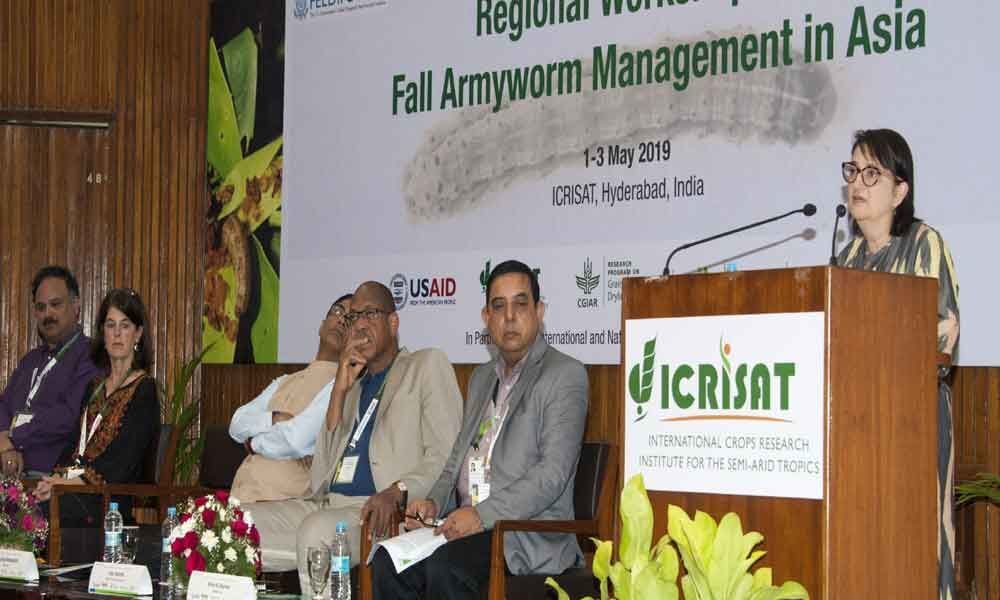Live
- Amid chants of ‘Inquilab Zindabad’, AAP takes out thanksgiving procession in Punjab
- Tamil Nadu CM Stalin Reviews Preparations For Cyclone ‘Fengal’ Amid IMD Alert
- Assam Vlogger Maya Gogoi Found Murdered In Bengaluru; Police Launch Manhunt
- Newborn Kidnapped From Karnataka Hospital; Police Launch Search
- Dyson Deals: Unbeatable Offers from Black Friday Sale to Cyber Monday
- Special Prayers Held at Devatparambu Ahead of Kodava National Day
- Update Your Apple Devices Now: CERT-In Warns of Critical Security Risks
- When citizens challenge a law, they participate in democratic process: CJI Khanna
- Every terror outfit challenging India's security will be dealt with strongly: PM Modi on 26/11 attacks
- Work on Hyderabad Metro Rail Phase-II to begin in January
Just In
Meet calls for steps to tackle Fall Armyworm


Over 100 participants from eight South and South-East Asian Countries attended the “Regional Workshop on Fall Armyworm Management in Asia” organised here on Wednesday.
Hyderabad: Over 100 participants from eight South and South-East Asian Countries attended the "Regional Workshop on Fall Armyworm Management in Asia" organised here on Wednesday. The Fall Armyworm (FAW) is one of the most destructive crop pests and has invaded crops in India and other countries in the region including Bangladesh, Thailand, Myanmar, and Sri Lanka.
Speaking at the opening day of the three-day workshop, Katherine Hadda, the US Consul General in Hyderabad, said, "The US government is working to address the Fall Armyworm in several African countries.
As the FAW has emerged in South and South- East Asia, collaboration is urgently required to manage its spread and minimise crop loss. Information on FAW's outbreak, along with advance warnings systems, can be extremely helpful to both farmers and policymakers. This workshop aims to foster collaboration between national and regional institutions as well as the private sector to support farmers in making informed decisions on FAW management."
Dr Trilochan Mohapatra, Secretary, Department of Agricultural Research and Education, and Director General of Indian Council for Agricultural Research, said, "The Government of India is committed to speedy and effective solutions to protect the interests of farmers and for the food security of the country.
We have noted with concern the entry of the Fall Armyworm in the country and responded quickly with appropriate measures including advisories and monitoring. Given the nature of the insect and the extensive damage it can cause, there is a need to collaborate and learn from international experience.
As we look for ways to protect our crops, this type of meeting is very beneficial to researchers, policy makers, extension workers and ultimately millions of smallholder farmers in the country as well as in the whole South Asia region." The workshop is jointly convened by the US Agency for International Development (USAID), with the technical expertise of International Maize and Wheat Improvement Center (CIMMYT), International Crops Research Institute for the Semi-Arid Tropics (ICRISAT), and resource persons from international and national research and development institutions.
During the workshop, participants shared their experiences, best practices approach, and challenges managing FAW in their respective countries. "The agricultural research community has been working intensively to take on one of the biggest challenges facing farmers across Africa and Asia, in the form of the insect pest, the Fall Armyworm. We need innovative approaches and cutting-edge science and more than that we need regional co-operation to fight this battle together," said Dr Kiran K Sharma, Deputy Director General (Research), ICRISAT and Director, CRP-GLDC.
FAW is a lepidopteran pest that feeds in large numbers on the leaves and stems of more than 80 plant species, causing major damage to economically important cultivated crops and grasses such as maize, rice, sorghum, and sugarcane but also other vegetable crops and cotton. It was first reported in West Africa in 2016 and quickly assumed epidemic proportions by spreading to over 44 African countries. In India, it was first spotted in Karnataka in 2018.

© 2024 Hyderabad Media House Limited/The Hans India. All rights reserved. Powered by hocalwire.com






